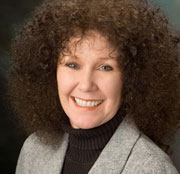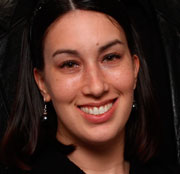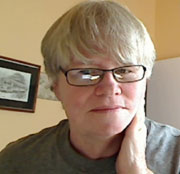Guest Post: No One Ever Just “Says” Something, by Christina Hamlett
No One Ever Just “Says” Somethingby Christina HamlettWhen I was a teen, I had an aversion to using “said” in a story. It was blah. It was ordinary. It was pedestrian. Why use “said”, I thought, when there were so many words that were way more expressive? Throughout high school English classes, my characters squealed, pontificated, reflected, mused and accused. As if that weren’t enough to liven up their dialogue, I was also generous in my deployment of adverbs. After all, who’s going to be a scarier villain: the one who “growled menacingly” or the one who said, “If you don’t give me the money, I’ll kill you”? By the time I started publishing my work, I was fortunate to have editors who pointed out that the habit of euphemizing the word “said” was to the detriment of the actual dialogue. Its quiet obscurity, they pointed out, was what allowed readers to skip over it and pay attention to what the characters were communicating. Throw a word like “elucidated” into the mix and it either sends a reader running to the nearest dictionary or colors her view that the author is a snob. As a screenplay consultant, I read a lot of scenes where writers have tried to explain exactly how a line should be delivered. This is problematic on two counts. The first is that actors don’t like being told what to do by anyone other than directors. Secondly, many of these instructions defy comprehension. How, for instance, does one “blanch uncontrollably”, “smile successfully” or “swear gracefully”? Listed below are the most common – as well as some of the most bizarre – parentheticals I’ve encountered. At the end of the day, sometimes “said” isn’t such a bad thing after all. 1. laughing maniacally 2. cackling hysterically 3. grimacing furtively 4. laughing satirically 5. smiling aggressively 6. whistling angrily 7. blushing fiercely 8. glaring impassively 9. staring aimlessly 10. blanching uncontrollably 11. swallowing lazily 12. chuckling wistfully 13. shouting hesitantly 14. seething wholeheartedly 15. coughing defiantly 16. chuckling contagiously 17. leering mightily 18. shouting orgasmically 19. blinking rhythmically 20. shrugging moronically 21. smiling soberly 22. staring wildly 23. sighing incessantly 24. yawning cavernously 25. gloating boldly 26. sneering leerily 27. sighing soulfully 28. smirking ruefully 29. groaning disparagingly 30. nodding emphatically 31. stretching indifferently 32. smiling rhetorically 33. fainting forcefully 34. sneezing emphatically 35. smiling successfully 36. smiling diagonally 37. whispering haughtily 38. yawning seductively 39. grinning gnashingly 40. breathing darkly 41. thinking sporadically 42. whimpering mincingly 43. scowling convincingly 44. chirping amicably 45. fidgeting wildly 46. guessing blindly 47. grinning indifferently 48. listening suggestively 49. barking congestedly 50. swearing gracefully  Former actress/director Christina Hamlett is an award winning author, ghostwriter and professional script consultant whose credits include 26 books, 128 plays, 5 optioned feature films, and hundreds of articles and interviews. Her latest release, Movie Girl, is the launch book of a new humorous fiction series targeted to teen and tween girls. To learn more, visit her website at www.authorhamlett.com. Former actress/director Christina Hamlett is an award winning author, ghostwriter and professional script consultant whose credits include 26 books, 128 plays, 5 optioned feature films, and hundreds of articles and interviews. Her latest release, Movie Girl, is the launch book of a new humorous fiction series targeted to teen and tween girls. To learn more, visit her website at www.authorhamlett.com.
*** Christina is also a WOW! Women on Writing Classroom instructor. Sign up now for her six week online course, SEE YOU AT THE MOVIES: An Introduction to the Craft of Screenwriting.
*** For information on all of our current classes, please visit the WOW! Women On Writing Workshops & Classes page.Labels: Christina Hamlett, screenwriting, WOW Workshops and Classes, writing classes
Last Chance to Enroll in 3 Classes!
We have two classes starting June 1st, and one starting June 2nd: ----------------  GET PAID TO WRITE: BECOME A FREELANCE WRITER! YOUR COMPLETE GUIDE TO FREELANCE WRITING BASICS, by Nicole LaMarco START DATE: Monday, June 1, 2009 DURATION: 10 weeks COURSE DESCRIPTION: This class is for beginning freelance writers or for those who are interested in becoming freelance writers. It includes all of the basics of freelance writing: overviews of the different fields in freelance writing, what is needed to begin, how to store ideas, where to get ideas, how much you should make, where to find clients, and how to get clients. In this class, I am your writing mentor through every lesson and every assignment. Make some extra money with your writing or create your own full-time freelance career! Learn from my personal stories, information, resources, goals, activities, lessons, and assignments. This class will provide the you with the structure and guidance you need to Get Paid to Write. A certification will be given to those who pass the entire class. ----------------  CREATING A CHARACTER SKETCH
by Janie Sullivan START DATE: Monday, June 1, 2009 DURATION: 3 weeks COURSE DESCRIPTION: Developing a character sketch for each character in the story is essential to the success of the story. The writer needs to know who the characters are, what they are thinking, and why they do the things they do in order to make them believable to the reader. This course will teach writers how to develop their characters so their readers will identify with them—whether or not they like them. ----------------  SHORT FICTION WRITING
by Gila Green START DATE: Tuesday, June 2, 2009 DURATION: 8 weeks COURSE DESCRIPTION: Through writing exercises and classmate and instructor feedback we will delve into the fundamentals of short fiction with a view to publishable work. We will explore a variety of craft elements including: character, plot, point of view, description, dialogue, setting, pacing, voice and theme. Course objectives: - To complete at least one work that is publishable.
- To encourage you to read published short fiction including, short stories, personal essays and flash fiction (Fiction under 800 words).
- To increase your confidence and skills as a writer.
- To develop a foundation for the skills of crafting, editing, and revising.
----------------
Visit the Classes Page for full details:
https://www.wow-womenonwriting.com/WOWclasses.html
Labels: character sketch class, freelance writing, short fiction writing, WOW online classes, writing classes
To Pay, or Not to Pay
Today, while watching my three-year-old son push his old, battered, blue engine along the tracks of a train table at Toys ‘R’ US, I ran into an old writing buddy. As her son joined mine at the train table, we started talking about, what else, writing. The topic soon turned to the value of writing classes. Why do we spend money on writing classes or programs? I’m an ardent supporter of getting all the support that you can use and afford in your writing. I’m currently a student with the Institute for Children’s Literature and have a lot of faith in the program and my instructor. As I spoke with my friend at the toy store, I explained to her why I was willing to shell out the dough for my writing program. Simply put, I knew I wanted to become a professional writer and publish books for children, but I didn’t have a clue of how to do it. Not to mention, the confidence that I had in my writing at that time was at a deficit and I needed the support and eye of a professional. The flexibility that the ICL offers as a correspondence course was also a great selling point. So for me, the choice to enroll at the ICL was easy. My writing buddy took a different approach to achieving her writing goals. She is reluctant to spend a large sum of money for a writing program. After taking an online course with Writer’s Digest, she opted to enroll in a short-term continuing education class at a local university. For her, the benefits of working with an instructor and other writers are very important. Though the time commuting to and from her class is tiring – she’s a single mom and works full-time – the camaraderie of the group is very rewarding. And the cost of the class doesn’t pinch her budget – too much. The real test, in my opinion, of the value of writing courses, is whether your writing skills improve as a result of having participated in the course. Do you take away skills that enhance your craft, thus, your chances of breaking into print? Personally, I feel that my knowledge, skills, and confidence as a writer have enhanced tremendously since I started with the ICL last year. As for my friend, she’s happy with her class and the friendships that she’s made, but is looking for a little more – something more concrete – that will help her take her writing to the next level and learn about the publishing world. So, what do you think about writing programs and courses? Do they add value your to skills and success as a writer? I’d love to hear about your experiences with writing programs of all stripes – MFA, correspondence, continuing ed, online, writer’s workshop, etc Does it pay to invest time and money into writing programs? Are some more useful than others? Kesha Labels: Kesha L. Grant, writing classes
|
 Former actress/director Christina Hamlett is an award winning author, ghostwriter and professional script consultant whose credits include 26 books, 128 plays, 5 optioned feature films, and hundreds of articles and interviews. Her latest release, Movie Girl, is the launch book of a new humorous fiction series targeted to teen and tween girls. To learn more, visit her website at www.authorhamlett.com.
Former actress/director Christina Hamlett is an award winning author, ghostwriter and professional script consultant whose credits include 26 books, 128 plays, 5 optioned feature films, and hundreds of articles and interviews. Her latest release, Movie Girl, is the launch book of a new humorous fiction series targeted to teen and tween girls. To learn more, visit her website at www.authorhamlett.com. 













